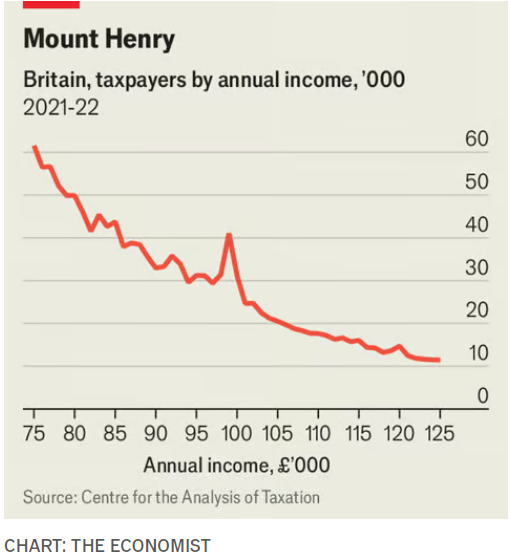In America, the poor often face relatively high implicit marginal tax rates, because they lose many benefits as their incomes rise. The Economist has an article discussing a similar situation in the UK, which affects the upper middle class, those earning over £100,000:
At £100,000, the removal of the tax-free allowance creates a 60% marginal tax rate for those lucky enough to have a fat salary. When national insurance and student-loan repayment—which act like a tax—are included, a young high-flyer can face a 71% rate. It is not quite 1960s levels, when The Beatles moaned about “one for you, 19 for me”, but it is not far off. . . .The Conservatives introduced lavish free child-care allowances, which are worth tens of thousands. Yet [the upper middle class] are excluded. When all this is put together, a [family] in London with two children under five is better off earning £99,999 than £149,000. Tax experts must often explain that tax rates ensure there are no gigantic losses when income crosses a certain threshold. In England, however, earning one pound over £100,000 can cost thousands.
High implicit marginal tax rates create a disincentive to generate wealth. A graph provided in the article shows that many taxpayers are bunched up at just under £100,000, presumably by refraining from working overtime when it threatened to push their incomes above the levels where they would lose the lucrative child tax allowance:

Suppose the UK started with a program where all taxpayers were eligible for the child allowance. Should a libertarian favor “means-testing” the program so that those earning over £100,000 no longer qualify? On the one hand, this would reduce government spending. On the other hand, it would raise the implicit marginal tax rate, making it harder to escape the middle income trap.
The US may soon face this dilemma with its Social Security program. I expect that there will be calls to reduce benefits for those with incomes above a certain threshold. But this will implicitly act as a tax on saving, making those who saved in order to supplement their Social Security with private savings look like suckers. If Americans respond by saving less, this might boost the trade deficit.
When I read about modern British politics, I’m continually amazed at the extent to which the supply-side achievements of Margaret Thatcher have been trashed by the modern Conservative Party. The Economist has two other articles that address the poor recent performance of the British economy. In one article, they discuss how the UK failed to take advantage of the opportunities available after they left the EU, such as making their airline industry more competitive:
The Competition and Markets Authority (CMA), a regulator, has been mustard-keen on such market reform for years; Rishi Sunak’s Conservative government appeared enthusiastic. Sir Keir’s Labour government is not. New ministers have their own priorities, and have concluded that an immensely complicated fight with vested interests is not worth the candle.
It is an illustration of how Britain has engineered the worst of all possible Brexits. Since slot rules in Britain were fixed in EU law, here was that rare thing: a bona fide Brexit opportunity to shake off protectionist rules that cosset creaking national champions. Singapore-on-Thames would welcome Singapore Airlines. Instead Britain has lost EU–market access, thereby weakening competition on British firms, while undertaking precious little of the regulatory simplification that might have fostered it.
Another article shows that the British public has come to regret the decision to leave the EU:

One reason why the gap is widening is that Brexit supporters are dying off:
During that campaign, Labour had a relentless focus on winning over wavering Tories. But the Reaper proved just as helpful. Between the elections of 2019 and 2024, roughly as many Conservative voters dropped dead as switched from Conservative to Labour.
Dead Man’s influence is felt in policy as well as at the ballot box. The dead are among the strongest supporters of Brexit. Two-thirds of those who shuffled off this mortal coil after 2020 supported leaving the EU.
